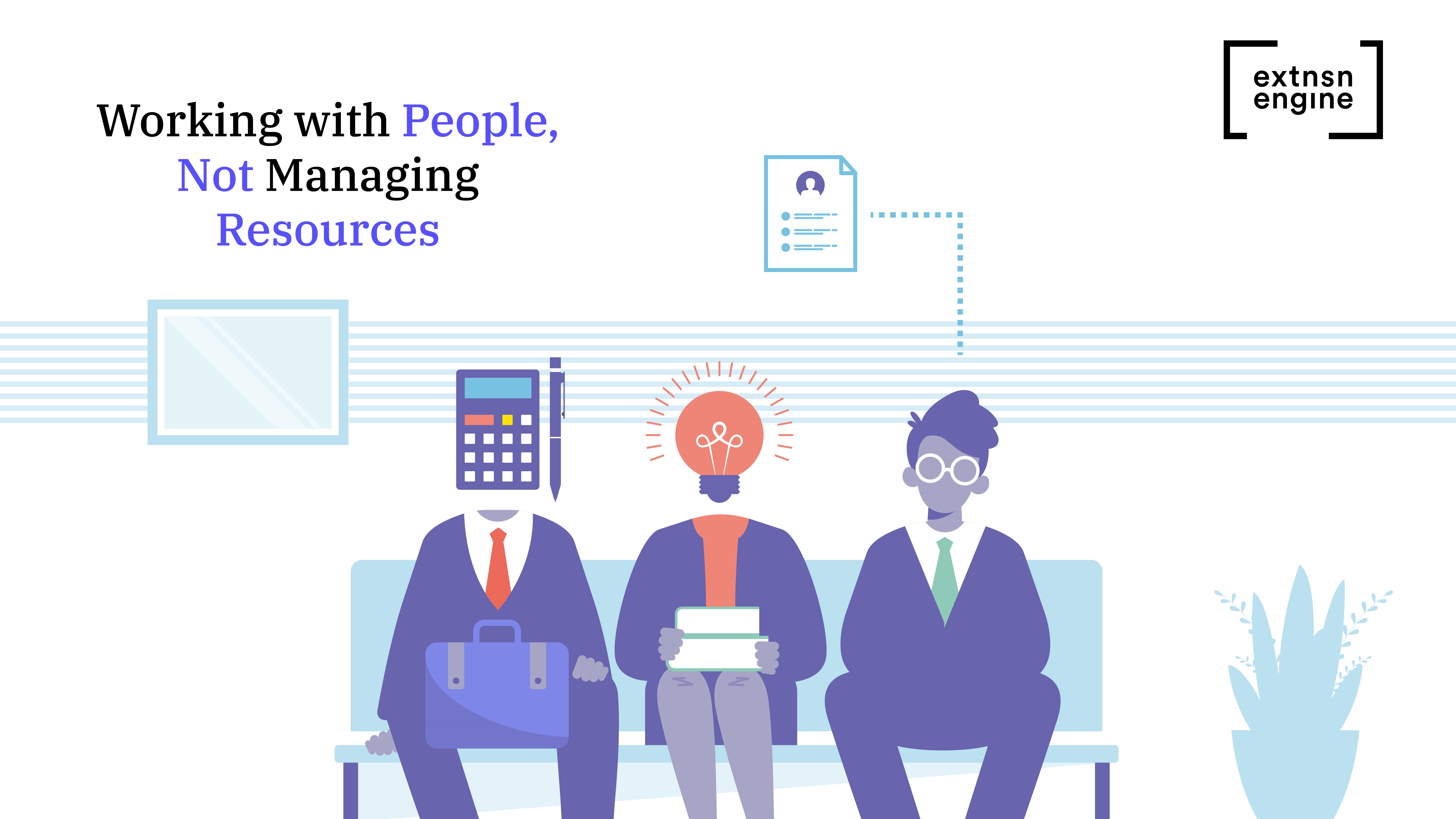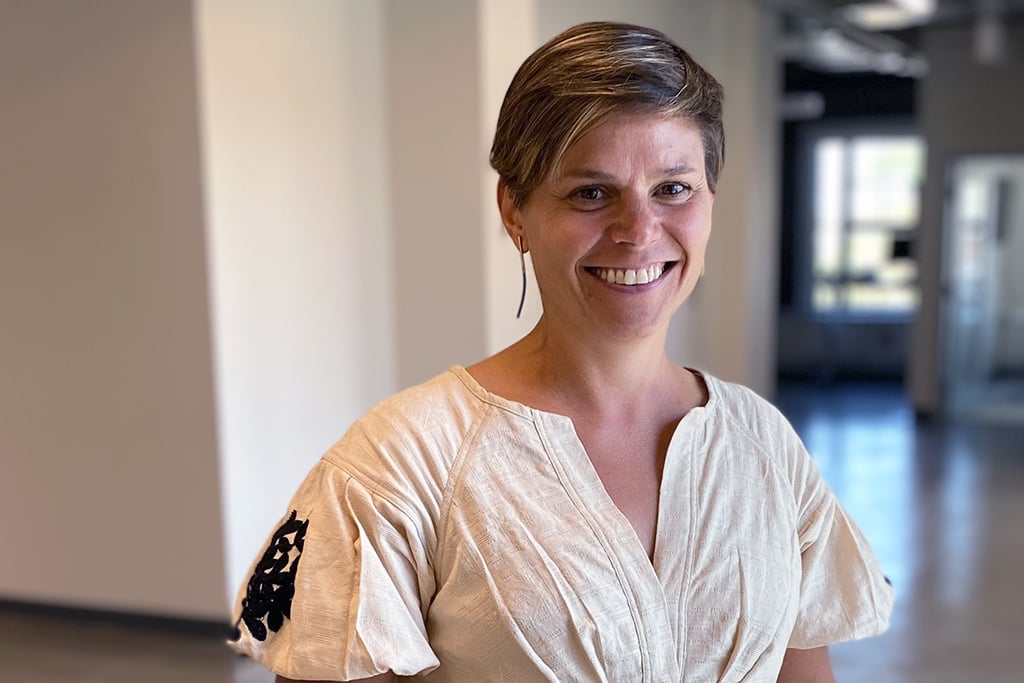When asked why Extension Engine has a People Ops practice and not a Human Resources (HR) department, I like to talk about the difference between “people” and “resources.” Resources include technology, physical space, desk supplies — things without talents or desires. People have abilities to contribute, objectives they want to accomplish, skills they want to learn, and ideas and feelings they want to express.
People Ops has many of the same responsibilities as a traditional HR department. But rather than viewing our staff as merely another “resource” to manage, we think about our team members and their work (in that order) holistically. Rather than compliance and enforcing rules, we’re focused on creating a place where you want to be — where you’re engaged and proud to work.
You might initially come to us with standard HR questions about benefits or payroll. But we strive to go beyond that. People Ops aims to help you think about your growth and development while supporting you on a day-to-day basis.
Resources are fixed, people choose their paths
A little background…
I didn’t start in People Ops, Human Resources, or anything under that umbrella. I began my career at a nonprofit, but when a colleague asked me to start up a business, I soon became the COO of a fast-growing pet care company.
Fast forward. I’m home on the couch. It’s midnight, about a month before my second child is due. I’m tired and uncomfortable, and yet I’m also working on a training strategy to meet fast expansion goals while simultaneously talking to colleagues by phone as we problem-solve a lost dog roaming the streets of Washington, DC!
I had to step back and ask myself, “Is this what I want in my life right now?” That helped me realize I needed a break from the pressure of a white-glove, rapidly growing startup. I wanted to focus on “starting up” my family. That led me to take a smaller role in a much larger, more established ed tech firm. As my toddlers literally got their feet underneath them, so did I. And I was ready for my next challenging adventure. I joined Extension Engine, a smaller company in the ed tech industry with an inspiring mission and great people.
In other words, I’ve had a zigzaggy professional journey.
Unlike a resource, a person gets to make decisions and try new things. They get to make choices and expand as an individual and a professional. And making one decision doesn't mean they have to be on that pathway their entire life.
In People Ops, we think about what you want to do, how we can help you do it, and what you actually want at this point in your life — in and outside of the office.
Those sound like intuitive questions, but people don’t often take time to ask them, and when they do, the answers aren’t the same for everyone. For example, people may think that the typical plan is to join an organization as an associate or a specialist, then get promoted to a senior level, and then become a director managing the whole department. But not everybody wants to be a manager, so that path isn’t right for everyone.
People Ops supports you in envisioning your career path, and it doesn’t have to be in only one upward vertical direction. Your career path may look like a lattice.
If managing people isn’t your thing, you could move up into an expert specialized role. You could capitalize on your transferable skills and move to another delivery area. If you need more space to focus on your personal needs, you could take a step backward (similar to what I did when I had my two children). If you want to try your hand at something entirely different, you could move horizontally to break into a new domain. And, ultimately, if you feel compelled to explore a completely different industry (as I did when I moved from the nonprofit world into a high-growth services startup and then into ed tech), we want to support you in that too. Open and honest relationships help People Ops do that.
Resources have features, but only people have skills
I’m proud to have worked in different industries. I started out recruiting and designing training programs for a nonprofit focused on leadership development for women and girls. I was able to take many of those skills into the for-profit sector and on to Extension Engine. The audiences have changed, but I’m still connecting people to roles based on their skills and interests, developing engaging hands-on training, and fostering supportive communities. I learned so much from the people and organizations I’ve encountered, which I’ve used and adapted across multiple roles.
People’s lives take a lot of turns. That makes their experiences richer and gives them skills employers want. It’s what got me here today! You may have started in one particular industry, but your skills can transfer to other contexts. People Ops helps individuals connect skills to contexts.
People Ops doesn’t fill jobs; we hire people. Starting with the job descriptions we write, we ask, “What do people really need to be successful here?” That helps us focus on transferable skills and look at the whole person in the context of the role — not as a set of requirements to check off.
Despite the old saying about “sticks and stones,” we know that words actually do matter. That’s why we also run our job descriptions through a gender decoder to ensure that how we talk about the role is inviting to diverse genders. Then, after analyzing our applicant pool, we go out there and actively recruit candidates who are underrepresented — people who might shy away from applying for a job they don’t think they fit 100%.
From there, we aim to create an equitable interview and assessment process, evaluating the appropriate measures, competencies, and potential enhancements to our culture. That process involves scorecards aligned to competencies and questions aligned with examples of what “good” looks like. We also educate the interview team on potential areas of bias, such as the “like me” syndrome. Along the way, we act as a guide to both the candidate and the hiring team. We constantly check in on the process and experience, looking at quantitative data and iterating where it makes sense.
As we proceed, we have regular conversations to see how you are experiencing the process. If you join our team, those conversations segue into a discussion about how you want to grow. People Ops at Extension Engine is structured to both highlight skills and discover what people want to do with those skills.
Resources can be enhanced, while people want to grow
A resource doesn’t care about the quality of its work, but people want to learn more and contribute in new ways. Learning and curiosity are at the heart of Extension Engine, so starting with onboarding, we want everyone to take ownership of their development. As a new hire, you’ll partner with People Ops and your manager to develop a learning plan. We don’t expect directors to be experts in every single area they manage. Instead, their role is to bring out the best in people to create teams of experts.
Each learning plan begins with a template. This ensures all new team members start with the same foundation. Then things get personal. We identify capacity-building projects that tap into your strengths, support the development of (you guessed it) competencies specific to your role, and enable you to make a real impact early on.
Competencies center on how we enact our company’s values and the best way we can offer our services to partners, in addition to the “hard” technical skills unique to each role. We also rely on competencies to help identify skills for the job. These shared expectations are more than a set of responsibilities for staff to check off. We want people to use their competencies to pursue their own standard of excellence and take pride in successfully fulfilling their role. We also use scaffolding: building upon frameworks, providing opportunities to shadow early on, and then slowly removing support systems until you’re ready to own the work.
The assumption is always that you can continue improving, applying feedback, and developing your talents through application. That’s why Extension Engine’s performance reviews are grounded in a growth mindset. They’re about reflecting back and using input to inform meaningful goals for the coming year. Those goals are meant to help you advance as an individual and an employee so that we can all be more successful and fulfilled.
We approach all of these areas with a hands-on approach: We want staff to learn by doing, on the job and from others. It’s not only solid learning. It helps them integrate the knowledge and experience into their own style and goals.
We maintain resources; we care about people
Sometimes we say a resource such as a photocopier has a “life cycle” or “lifetime,” but people are the only parts of an organization that literally have lives. People Ops aims for efficiency, but above all we want to personalize the entire employee journey.
In a nutshell, resources are certainly useful, but people are dynamic, interesting, talented, inspired, and inspiring. People Ops is where a person’s goals animate an organization’s mission and impact.
Keep Learning
To learn more about what it’s like to work at Extension Engine, please check out our Careers page.



